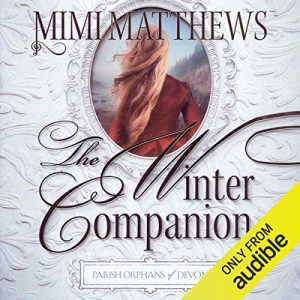Narrated by Alex Wyndham
The Winter Companion is the fourth and final book in Mimi Matthews’ Parish Orphans of Devon series, which follows four young men who formed strong bonds of friendship as boys and who remain close friends in adulthood. This story takes place over the Christmas period and during a ‘family’ reunion as Justin, Tom and Alex (heroes of books 1-3) and their wives gather to celebrate the festive season at Justin’s North Devon home, which is where the fourth member of their group, Neville Cross, lives and works with the animals on the estate while also training to take over from Justin’s steward when he retires.
Unlike the other men – Justin went into the army, Tom moved to London and became a lawyer and Alex left England to make a living gambling and grifting – Neville never left Devon and doesn’t believe he ever will. An accident when he was younger left him with a brain injury which has affected his ability to transfer his thoughts into words. His thought processes and mental capacities are unaffected, but his difficulty in finding the right words – a situation which worsens whenever he’s nervous – has caused many to believe him to be lacking in intelligence. His friends know differently of course, but Neville is very self-conscious about it and prefers to have as little contact with other people as possible, instead spending most of his time with the horses and other animals in his care.
Lady’s companion Clara Hartwright accompanies her employer Mrs. Bainbridge (the widowed aunt of Laura, heroine of A Convenient Fiction) to Greyfriars Abbey for the Christmas season, and meets Neville when she asks if he will help to care for the elderly pug she has ‘inherited’ from her previous employer. Clara is working as a companion in order to help fund her brother Simon’s education at Cambridge, but she has plans for her future that do not include spending days fetching and carrying for others. When Simon, who is studying the natural sciences, has finished his education and strikes out in the world as a naturalist, he has promised to employ Clara as his secretary, and she longs for the day when she will be able to take up her pen to catalogue and describe all his findings and ideas. Simon has been sending Clara his lecture notes, which she has been eagerly studying and devouring, feeling that even though she cannot attend university herself, she is studying the course through Simon’s correspondence.
The Winter Companion is a gently moving, character-driven story that builds slowly, allowing time for Neville and Clara to become friends before they consider that there might be the possibility of their becoming anything else. Clara is quickly able to see beyond Neville’s speech impediment and recognise the caring, compassionate, shy man behind it, while Neville sees past the drab companion to the vibrant young woman with hopes and dreams he longs to know. They’re perfectly nice, perfectly decent people – but I didn’t find either of them particularly memorable, and their romance is fairly tepid. I said something similar in my review of A Convenient Fiction; I’m not talking about the fact that Ms. Matthews writes ‘closed door’ romances, I just never felt any real spark or strong emotional connection between them. The conflict in the story is mostly born of Neville’s low self-esteem and his tendency to play safe; I think the author may have been trying to intrigue listeners with hints about Clara’s backstory, which is one of the reasons she feels it incumbent on her to help support her brother, but it was easy to guess and ultimately, the whole thing was rather dull. I did feel for Clara late on in the book, when she realises that the life she’d envisaged for herself was never going to be, but otherwise, the plot is very slight. It’s also almost completely devoid of humour.
I appreciated the author’s attention to period detail; her descriptions of the Christmas traditions at Greyfriars is evocative and her characters always behave and speak in a manner that befits the time at which the books are set – and that’s not something I can say very often about the majority of historical romances being published at the moment.
Alex Wyndham has always been a go-to narrator for me, although when I reviewed his performance in the previous book in the series, I remarked upon the fact that while his overall performance was good, he’d adopted an odd sort of half-whisper for most of the narrative and some of the dialogue I didn’t recall hearing before and that I didn’t particularly care for. His voice is deep and rich with lots of ‘tone-colour’ to it, and I found it a real shame that he seemed to have decided to stick with a limited palette (for want of a better comparison!) rather than to use the full range of the tones and timbres he has available to him. I picked up The Winter Companion in the hope of discovering that what I’d previously noted was an anomaly, but sadly, I can’t really say that it was, and I hope it’s not a permanent change. In every other respect, his performance is every bit as accomplished as I’ve come to expect from him; well-paced, clearly differentiated and emotionally nuanced. He does an especially good job with Neville’s speech, not injecting overly long pauses or over-exaggerating his hesitancy. The character’s frustration at not being able to express himself as he wishes to comes through clearly as well. All the heroes of the previous books appear here and are clearly delineated and easy to identify, and the softer, higher-pitch Mr. Wyndham adopts to portray the ladies is appropriately feminine. I particularly enjoyed his interpretation of Mrs. Bainbridge as a bit of an Edith Evans-esque grande dame.
While The Winter Companion is the fourth in a series, it works perfectly well as a standalone, as enough information is given about the relationship between the four former orphans for a listener new to the series to be able to make sense of the story. That said, I’ve read and/or listened to three of the books in the series, and I think this is the weakest; it’s nice, the characters are nice… but not much happens. As I said in my review of A Convenient Fiction, I seem to be in a minority – Ms. Matthews has many fans, but three books I’ve individually rated no higher than a B- would indicate that this author is not for me.
In the end, I can’t recommend The Winter Companion. The narration, even with the issues I’ve noted, is good, but the story is dull and uneventful, and the characters are unmemorable.
Caz
Buy The Winter Companion by Mimi Matthews on Amazon





Excellent review, Caz. One man’s meat is another man’s poison in Ms. Matthews case I think. The author has so many fans and the premise actually attracts me, but I’ve tried her books before and they never quite deliver what I’m looking for.
Exactly. Although Em reviewed her latest, Fair as a Star and loved it – and she had had similar opinions to both of us about the author’s earlier books. I doubt I’ll get around to reading it (especially as HR isn’t really working for me right now) and if it comes to audio… well, I wasn’t wild about AW’s narration here and if the changes I’ve noted are permanent, then I’m even less inclined to listen :(
I completely agree with your assessment of Alex Wyndham’s narration in this series. I couldn’t listen to a whole book of it so I ended the series with the first one, which I liked a lot. I have listened to other books narrated by him and loved his performance. Not sure what happened to make him change his delivery.
I’m glad to know it’s not just me who’s noticed! I actually have another historical romance by him to review that I agreed to do before I listened to this one. If that has similar issues, then I think I may not be listening to him any more, and that’s a huge shame, but historical romance needs more good male narrators.
I’m listening to The Lost Letter by Mimi Matthews at the moment. Justine Eyre does a good job with the narration. Overall I like it, although it’s not quite as good as Mia Vincy’s books and definitely not as good as Stella Riley’s. But it’s a good story, and I’m enjoying it. My big quibble is that the plot relies on a stupid misunderstanding that could have been remedied by a few words.
Like you I hope Wynnham’s narration style hasn’t been permanently altered.
I… can’t be doing with Justine Eyre. Her English accent isn’t great and she seems to speak through her nose! She narrates so many historicals these days – and you may have noticed I don’t review any of them! I nearly cried when I saw she was narrating Julie Anne Long’s Pennroyal Green books – I’ve not read the earlier ones and audio is my catch-up method. Sadly, they’ll remain on my TBR until I can get to them.
I haven’t forgotten the book in which she gave a major secondary character – a Scot – an Irish accent, despite the fact that the text clearly stated he was Scottish. He was also the hero of the next book in that series. Needless to say, I decided not to listen to that one.
In the books by this author I’ve read and listened to, all of them had really strong first halves – and then fizzled out. I hear good things about her latest book though.
We all have narrators we feel that way about, so I get it. Justine Eyre’s not my favorite, but she didn’t take me out of the story. I struggle with Susan Duerden, even though she is very popular. Her narrations have a sing-song quality that takes me out of the story at times. I never cared for Anne Flosnik before, but I’ve listened to some samples recently and like her better than Duerden, although Flosnik, too, sing-songs a bit.
Oh yes, absolutely. I’ve stopped listening to Duerden as well; I’ve reviewed some of her older recordings favourably, but that whispering thing she does has got worse. I haven’t listened to Flosnik in a while, but I think she sounds robotic. There aren’t many good narrators about in historical at the moment, sadly. Mary Jane Wells doesn’t seem to be doing much at the moment, and nor does Kate Reading. Tantor uses Mary Sarah a lot (she’s a no-no for me) and a couple of others who are sort of middling.
Nice review, as usual, Caz. I am going to start listening to this book today, but I am fully prepared to DNF and return it to Audible if the whispering bothers me as much as It did in the last book. I even noticed it, to a lesser extent, in his narration of Lucinda Brant’s latest.
So, if I am listening and find myself tempted to say, “Speak up, young man,” in my Lady Catherine de Burgh voice, I shall probably call it quits.
Thank you. I liked the story in the previous book more than this one, but as was the case with the other books by this author I’ve experienced, the second half was a letdown. The narration is still good in many ways but it’s not the AW of Lucinda Brant and Stella Riley’s earlier books, that’s for sure.